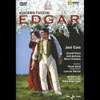Puccini Edgar
The first recording of the four-act version of Puccini’s Edgar
View record and artist detailsRecord and Artist Details
Composer or Director: Giacomo Puccini
Genre:
DVD
Label: Arthaus Musik
Magazine Review Date: 12/2009
Media Format: Digital Versatile Disc
Media Runtime: 157
Mastering:
Stereo
DDD
Catalogue Number: 101377

Tracks:
| Composition | Artist Credit |
|---|---|
| Edgar |
Giacomo Puccini, Composer
Amarilli Nizza, Fidelia, Soprano Giacomo Puccini, Composer José Cura, Edgar, Tenor Julia Gertseva, Tigrana, Mezzo soprano Marco Vratogna, Frank Turin Teatro Regio Chorus Turin Teatro Regio Orchestra Yoram David, Conductor |
Author: po'connor
The libretto of Edgar is taken from a story by Alfred de Musset. The attraction must have been the contrast between the hero’s infatuation for the exotic temptress Tigrana, and the pure village maiden Fidelia. The situation is not unlike Carmen, but then there are huge plot complications when Edgar pretends to have died in battle and stages his own funeral, in order to test the love of his rival girlfriends. As Puccini must have recognised, the fourth act comes as an anticlimax after this big confrontation, with Edgar disguised as a monk, declaiming from the pulpit.
In Lorenzo Mariani’s Turin production, the action is transposed from the 14th century to the time of the Risorgimento. Act 1 finds everyone dressed in white for a summer picnic. When Edgar and Tigrana have escaped to the city in Act 2, it looks like a production of Traviata, with all the men in top hats and the girls in red feathers. Act 3, though, goes with terrific zest, José Cura as Edgar in disguise, holding forth with burnished tone, and Amarilli Nizza singing “Addio, mio dolce amor” – the one passage that has become fairly well known – with considerable feeling.
Act 4 turns out to have a sort of mad scene for Fidelia. No sooner has she been told that Edgar is in fact alive, than she is stabbed to death by Tigrana; Julia Gertseva makes the most of this ungrateful part. In the end, Edgar is left without either. One can sense Puccini grappling with all the diverse influences on his music, a bit of Wagner, a bit of Verdi, a touch of Donizetti – occasionally his own style seems to be forming, only to be swamped again. Yoram David controls the huge orchestra and chorus with impressive authority.
Discover the world's largest classical music catalogue with Presto Music.

Gramophone Digital Club
- Digital Edition
- Digital Archive
- Reviews Database
- Full website access
From £8.75 / month
Subscribe
Gramophone Full Club
- Print Edition
- Digital Edition
- Digital Archive
- Reviews Database
- Full website access
From £11.00 / month
Subscribe
If you are a library, university or other organisation that would be interested in an institutional subscription to Gramophone please click here for further information.




